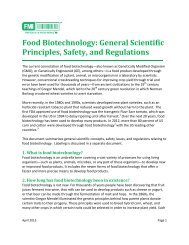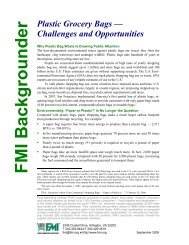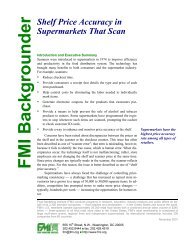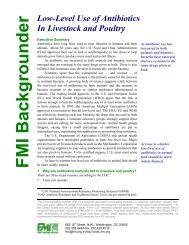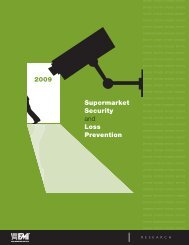Global Commerce Initiative EPC Roadmap - GlobalScorecard.net
Global Commerce Initiative EPC Roadmap - GlobalScorecard.net
Global Commerce Initiative EPC Roadmap - GlobalScorecard.net
Create successful ePaper yourself
Turn your PDF publications into a flip-book with our unique Google optimized e-Paper software.
<strong>Global</strong> <strong>Commerce</strong> <strong>Initiative</strong> <strong>EPC</strong> <strong>Roadmap</strong><br />
minimum that is necessary to comply with requests<br />
from only their most important trading partners.<br />
The final extreme is that the individual believes<br />
more is possible than actually is at that time and<br />
does not attach a firm basis of reality to grandiose<br />
ideas of implementation.<br />
The turning point at this decision juncture is that the<br />
person responsible for <strong>EPC</strong> realises that, in order to<br />
move forward, he or she will need to transform<br />
theoretical knowledge into practical knowledge and<br />
action. This realisation is reached by recognising that<br />
Companies that are further down this <strong>EPC</strong> adoption<br />
roadmap contend, without exception, that this step<br />
is all about business process and simply being<br />
comfortable with the technology. The experiment<br />
phase is an iterative combination of understanding<br />
business process possibilities coupled with limited<br />
trials of the RFID technology.<br />
Many companies currently in this phase report that<br />
the practical experiments give them far better<br />
insights than a substantive paper-based business<br />
case exercise.<br />
Working Towards the Business Case 21 Barriers to Execution 22<br />
the technology is evolving, others are getting a head<br />
start, and perhaps the time has come to move to the<br />
next stage — experimentation — if the company is to<br />
grasp the true potential for the <strong>EPC</strong> vision.<br />
4.3.2 Experiment<br />
The first key activities include developing a highlevel<br />
business case and a small technology proofof-concept<br />
pilot specifically focused within the four<br />
walls of a company. This is a critical step in order to<br />
drive realism and pragmatism into the leadership,<br />
allowing the company to continue strategically on<br />
the journey. However, it is important the business<br />
case and technology proof-of-concept is not overengineered<br />
at this stage. If successful, some initial<br />
funding is usually provided.<br />
The development of the core elements of RFID —<br />
tags and readers — is fast changing as technology<br />
and manufacturing innovation improves the<br />
reliability, functionality, and cost of the equipment.<br />
This experiment phase allows companies to<br />
understand more clearly how well suited this<br />
current technology is to the company’s products<br />
and environments. The key knowledge gained has<br />
been that it is very difficult to understand process<br />
possibilities and technology capabilities without a<br />
degree of experimentation in the company’s internal<br />
environment.<br />
Another turning point in the <strong>EPC</strong> journey is reached<br />
when the experiments are successful, the process<br />
opportunities are evident, and a critical mass of<br />
people in the organisation are excited about the<br />
34 © Copyright November 2003, <strong>Global</strong> <strong>Commerce</strong> <strong>Initiative</strong>/IBM




